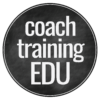Join CTEDU Graduate Amanda Dewey and CTEDU Co-Founder John Andrew Williams for a discussion on Amanda’s journey into life coaching, and the coaching tools and skills she leans on when helping clients through anxiety and stress in the modern world.
Stay tuned until the end for a fun surprise!
About Amanda:
Born and raised in NH now living in the deserts of Las Vegas. Amanda once suffered with stress and anxiety that closed her off from opportunity and blocked all of her potential for growth. Once Amanda was able to face these truths, she learned that her anxiety did not define who she was as a person, and she was able to take back control of her own life.
“I was behind the wheel again, heading right for greatness. It’s your turn now, to take back your life and regain control. Don’t let your inner voice control your reality.”
Learn more about Amanda’s story and her coaching practice here.
Read the PDF Transcript here: Coaching Tools to Face Anxiety Transcript
Who has been an inspiration in your life? Share your appreciation for them in the comments down below!

One Community member asks: How did you use the values learned in your family of origin to overcome your fears?
Another community member asks: How does the use of an accountability partner, if used effectively, help overcome the what ifs? Are their guidelines to follow to support mindfulness?
In response to the questions of “How did you use the values learned in your family of origin to overcome your fears?” I can answer that happily. Our family values were always based around support, love, and strength. With those 3 values it is hard to not feel secure right? Unfortunately fear is so large and shows up in so many ways that it is almost too difficult to fight it. The ways that I have been able to overcome the fear in my life comes in a few different steps. I have always allowed myself to sit with my fear for a few minutes, to digest it and to see where its stemming from, and of course if it is “real”. In that time I try to remember what I am grateful for, this is where remembering my families values comes into play. I remember the strength I have around me, the love that is shared and the support that I have. Knowing those values and knowing I am not alone has helped me face fear numerous times.
I hope this answered your question 🙂
In response to the question “How does the use of an accountability partner, if used effectively, help overcome the what ifs? Are their guidelines to follow to support mindfulness?”
Accountability partners are HUGE!!! If you are not ready to hold yourself accountable everyday and need the use of a partner I highly suggest this. Sometimes it gets tiring holding yourself accountable, and sometimes you could be helping the other person without even knowing it. To the question of if they can help the “what ifs” I do believe this is a lot of internal work. An accountability partner is great to hold you to routines, motivation, projects, etc. It is hard to hold someone accountable for what is going on inside of their mind. Talking to someone may be of help, but in order to fully kick the “what if” there needs to be deeper work that is done.
The best part about mindfulness to me, is there are no set guidelines just intentions. That’s the main tool I use and work with and a big part of what I will be discussing in next weeks work with. Visualization is such a big part of creating that mindful setting. You start to notice the things that distract you (how can you become mindful when there is so much clutter going on?) Can you close your eyes and block out all the noise? Choose something that brings you peace and tranquility and focus on that for 20 seconds, then 30 seconds and so on and so forth.
I hope this was able to answer your questions 🙂